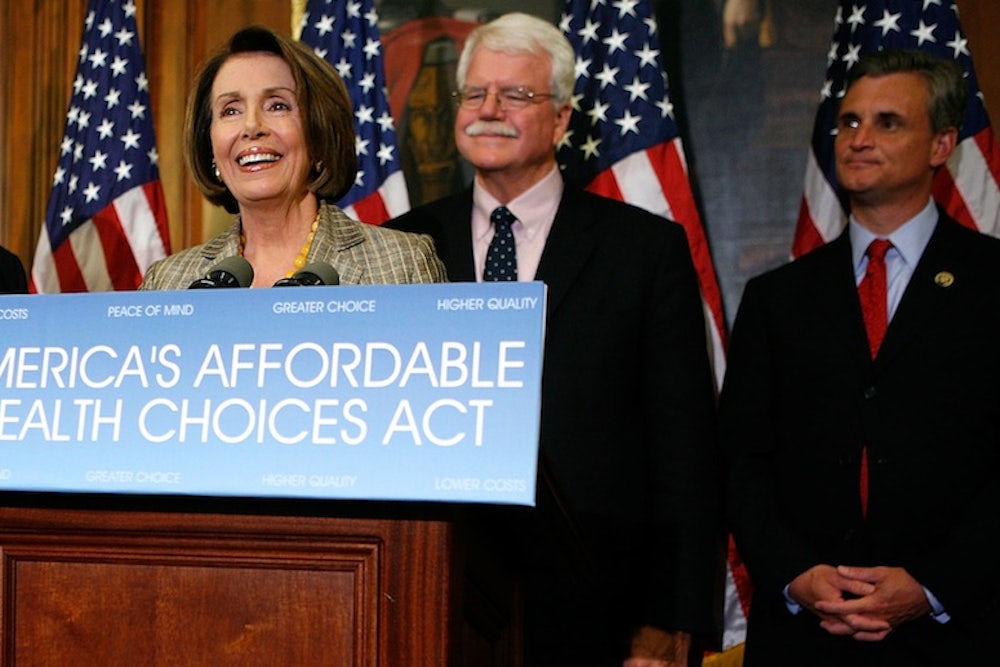On January 15, 2010, the Affordable Care Act wasn’t yet law. It was just two separate health care reform bills—one passed by the Senate, one passed by the House. With Martha Coakley still the presumptive winner of the upcoming special election in Massachusetts, congressional leaders were working with the White House on fusing the proposals into one. Among the issues they were addressing was the design of the new marketplaces, then called “exchanges,” through which people could buy regulated private insurance and get federal tax credits worth hundreds or even thousands of dollars a year.
The issue hadn’t generated much publicity, the way that the public option had. But it was a source of contention. The House bill envisioned one, national exchange, with an option for states to create their own versions if officials were willing and able. The Senate bill called for a series of state exchanges, with some kind of federal backstop in cases where state officials weren't up to the task. I'd heard that the Senate version was likely to prevail, so I was e-mailing House sources to see how upset they were.
In the wee hours of the morning, one of them responded. It was Debbie Curtis, then chief of staff to California Congressman Pete Stark. She was ok with the arrangement, she told me, because she'd become convinced that the differences were more semantic than substantive. "I really think the exchange thing has become a red herring," Curtis wrote. "When you remove the perception, our bills have always been pretty similar. They said state first, some sort of fall back second. Ours said state’s [sic] can opt out otherwise national plan."

At the time, the message didn’t seem terribly consequential. But more than four years later, it may tell us something important about the central issue in the latest legal challenges to Obamacare: what Congress was trying to do when it wrote the law.
By now, you have probably hard about these lawsuits, about which two federal courts offered conflicting opinions last week. The lawsuits allege that the lawmakers who wrote and voted for the Affordable Care Act wanted to restrict those tax credits, making them available only in states where officials built and operated their own exchanges. The idea, supposedly, was to discourage state officials from dumping that work onto the federal government.
Harry Reid, Nancy Pelosi, plus many of their colleagues and advisers, have said repeatedly that the theory is nonsense. They say that they wanted everybody to have access to financial assistance, regardless of how state officials acted—and that their intentions are pretty obvious if you read the law as a whole rather than focusing on the one, admittedly ambiguous passage on which critics are basing their lawsuits. As I've mentioned a few times, I find the Democrats’ argument utterly convincing. So do most people who watched the debate closely at the time.
The law's critics dismiss such arguments as after-the-fact rationalizations or, worse, deliberate efforts at dishonesty. With that in mind, last week I started hunting for contemporaneous commentary—something written or said in 2009 and 2010, while Congress was still writing the Affordable Care Act, that would make clear the architects’ intent. So far I haven’t found much. The issue of withholding subsidies from people in certain states never came up, so nobody reacted to it. That's one reason to think the lawsuit's theory is wrong. Limiting the subsidies, as the critics contend Democratic leaders sought to do, would have been hugely controversial.
But that e-mail from Debbie Curtis addresses the issue indirectly, once you consider the contours of the debate at that time. The House version of the bill, which became mostly irrelevant once Coakley lost the Massachusetts election and Democrats lost their filibuster-proof majority in the Senate, made subsidies available to everybody. Nobody has ever questioned that. If Curtis thought the Senate version was "pretty similar," as she said, that means she assumed everybody would get subsidies in the Senate version, too—even though, as she also pointed out, some would be living in states relying on the federal "fall back."
Lest there be any doubt about this, Curtis, who now works on the District of Columbia Health Benefit Exchange Authority, confirmed as much to me over the weekend, when I contacted her about the e-mail and received permission to publish this excerpt of our "background" conversation.
It feels weird and vaguely absurd to parse a four-year-old, four-sentence e-mail this way. But this whole case is weird and vaguely absurd. At least this particular message makes for good source material.
Curtis' boss was chairman of the subcommittee on health for the House Ways and Means Committee. She was his primary adviser on health issues as well as a member of the Ways and Means committee staff. Because of those affiliations, Curtis was among a handful of House aides who worked directly on crafting legislation and then negotiating with the Senate over the final version. There are probably no more than 50 people in all of Washington who played a similar role in negotiations—and even fewer who can speak directly to what members of Congress thought.
The email is not a smoking gun. But it is consistent with a ton of circumstantial evidence—like the assessments from the Congressional Budget Office and Joint Tax Committee, as well as the wording of the rest of the bill, all of which suggest lawmakers intended for subsidies to be available everywhere. In addition, Curtis wrote her e-mail at a time when nobody had any inkling the subsidy structure would be a legal issue. Nobody can dismiss it as excuse-making or faulty memory. It's a window into what the legislation's authors were thinking at the time that they wrote it. And their opinion is the only one that really matters.
